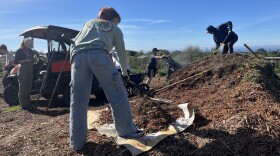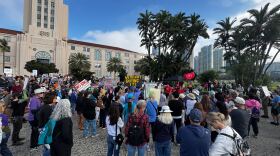STEVE INSKEEP, host:
And let's move next to Iran. The International Atomic Energy Agency reports that Iran has produced close to 1400 pounds of what it calls low-enriched uranium. Now, if that material were to be enriched further, experts say it would probably be enough to make a single atomic bomb. To find out more about what this development means, we've contacted NPR's Mike Shuster, who covers these issues. Mike, welcome to the program again.
MIKE SHUSTER: Hi, Steve.
INSKEEP: So, that sounds kind of frightening. Is it?
SHUSTER: Well, it's largely a theoretical figure. The inspectors of the International Atomic Energy Agency have been keeping close track of the enrichment activities of Iran over the past two years. And Iran continues to enrich uranium to a very low level, what is called low-enriched uranium, and this can be used ultimately as nuclear fuel in nuclear power plants or reactors. There's a little bit of nuclear physics involved, but essentially this is the isotope of uranium known as U-235, under five percent, and that can be nuclear fuel for nuclear reactors. And what the IAEA said in a report this week was that Iran has now stockpiled about 1400 pounds of low-enriched uranium. Theoretically, if Iran were to decide that it wanted to enrich further to a level of 90 percent U-235, if they went ahead and did that, theoretically, this is an amount of low-enriched uranium that could result in enough highly enriched uranium to make one bomb.
INSKEEP: If we can just explain this in layman's terms as best as we can, when we say enriching uranium, you've got this uranium ore; it's got uranium in it along with a bunch of other minerals, and is this basically a process of making it more and more pure?
SHUSTER: It's the process of making uranium-235, a specific radioactive isotope of uranium, more and more pure. U-235 exists in national uranium under one percent. So, you have to get more of it in a more concentrated form in order to produce nuclear fuel, and even much greater concentrated form in order to produce the fissile material that could go into a nuclear bomb.
INSKEEP: So, why is this, in some sense, a symbolic figure, if they've got 1400 pounds that they have enriched?
SHUSTER: It's just something that physicists and analysts are looking at and are noting to themselves that this is a stockpile of low-enriched uranium that the Iranians have created. And if they so chose, they maybe could go on to enrich it in order to make a bomb. I should add, though, that this stockpile of low-enriched uranium is under the watchful eyes of the International Atomic Energy Agency. Its inspectors go to where it's been stored regularly. They have video monitors there. The canisters are sealed with IAEA seals, so that if the Iranians decided that they wanted to take this stockpile of low-enriched uranium or do something else to it, the international community would know immediately.
INSKEEP: So, should the rest of the world be concerned?
SHUSTER: It's probably fair to say that the rest of the world should continue to be concerned about Iran's ambitions in the nuclear field, that this is a theoretical threshold that they may have crossed, but it doesn't change anything immediately.
INSKEEP: Well, how concerned should President-elect Obama be about a problem that he is going to inherit?
SHUSTER: It's clear that President-elect Obama is already concerned about the possibility of a nuclear weapon in the hands of the Iranian government; he said so numerous times during the campaign. The United States has been concerned about this through several administrations going back to the 1990s. The key now for the new administration is to decide what approach it wants to make to Iran that might maximize convincing Iran not to go all the way to a nuclear weapon. And that strategy we don't know yet.
INSKEEP: Well, how about on the other side, Mike Shuster? Has Iran signaled whether it wants to take a different approach with the new administration?
SHUSTER: Iran has given some signals that you might interpret that way, particularly this letter of congratulation from President Mahmoud Ahmadinejad. This is something that Iranian presidents since the Islamic Revolution 30 years ago have never done. So, there seem to be some interest on Ahmadinejad's part in starting some kind of a dialogue with President-elect Obama. And basically, he has gotten favorable comment in Iran for this. Just how further the Iranians might want to take it, we'll have to see.
INSKEEP: NPR's Mike Shuster, thanks very much.
SHUSTER: You're welcome, Steve.
(Soundbite of music)
INSKEEP: You're listening to Morning Edition from NPR News. Transcript provided by NPR, Copyright NPR.







